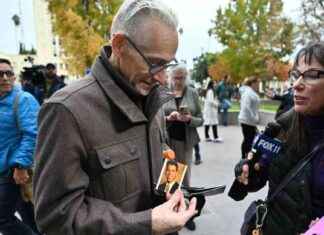Two and a half years after the murder of ecologist leader Berta Cáceres, this Thursday will be known the judgment against their murderers. At least those who squeezed the trigger. Not of those who gave the order, according to the complaint his family. The chamber I of the Court of Tegucigalpa scheduled for next Thursday 29 the reading of the resolution of the murder of the 2 of march 2016 in Intibuca, in Western Honduras.
MORE INFORMATION
‘What would you say now to my mommy?’, by Berta Zuniga Caceres The death of Berta Cáceres amplified their struggle, A report says that the Government of Honduras was involved in the murder of Berta Cáceres
On the bench they are sitting eight citizens accused of being responsible for the crime of murder and attempted murder. The daughters of the ecologist, recognized that the evidence are overwhelming against them and expect them to be sentenced, but they report that only thinks for the links lower in the chain, and that the trial, which has lasted five weeks, was held in the midst of serious irregularities and that will continue to fight for the conviction for the intellectual authors.
“there Will be convictions but not justice,” says Bertha Zuniga Caceres, daughter of the environmentalist and current coordinator of the Council of Civic and Popular Organizations in Indigenous peoples of Honduras (Copinh), who was leading her mother until she was killed.
Until that day, his mother, 44-year-old was one of the voices that had been raised against the construction of a dam in their community. Not even the Nobel green that he had received in the preceding year, protected them from the bullets of two gunmen who sneaked into his house of Hope.
it Was 11 in the night and the killers arrived in a Volkswagen gray, they put three shots in the Mariobet abdomen and fled. Before they escaped, they discovered in the next room there was another man, Gustavo Castro. Castro had arrived the previous day from Mexico where she leads the organization Other Worlds Chiapas. Gustavo and Berta were old friends that had gone to sleep after taking a cigar on the porch of the modest home. When the killer shot him at close range, grazed his ear and he only made a scratch, but he started to bleed profusely and the gunman fled the scene thinking he was dead.
In the trial, which began last October 20, the lawyers of the family and of Copinh were excluded, after an appeal of a disqualification on the members of the court with doubts about his impartiality. The prosecution assumed it since then exclusively by the prosecutors of the Public Ministry (MP)
“The trial has been riddled with irregularities, it has been left to the margin of the judgment of the family and of Copinh have been at the margin of the research”, explains Marcia Aguiluz, head of the Center for Justice and International Law (CEJIL). “We have been refused information that was forfeited to the company DESA and that would give an account of the participation of the company in their murder,” he adds.
Two of the accused are directly linked with the hydroelectric company: Sergio Rodriguez Orellana, the environmental manager and the communications of the company, and the exteniente of the army Douglas Bustillo, the head of security for DEVELOPMENT between 2013 and 2015. The other two links military: Mariano Díaz Chávez, a major asset of the special forces trained in the united States with a history of intelligence and its former accused Henry Hernández Rodríguez. In march, was also arrested the chairman and ceo of DESA, David Castillo, accused of organizing the murder. The family points to the company’s shareholders that they would have to Berta Caceres as a target.
After the murder of the ecologist, united States, the UN and even The Vatican demanded the clarification of the case. Berta Cáceres happened, then, to be a symbol of defense of the land in a country where heroes are dead. Honduras is one of the most dangerous countries in the world to defend the earth and the environment, with at least 130 defenders killed in the last ten years, and an economic policy which has approved dozens of projects of mines and energy in rural and indigenous communities without consultation or adequate studies of environmental impact.






